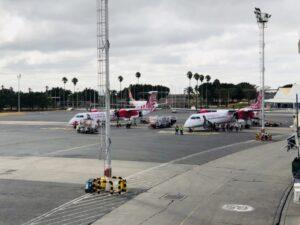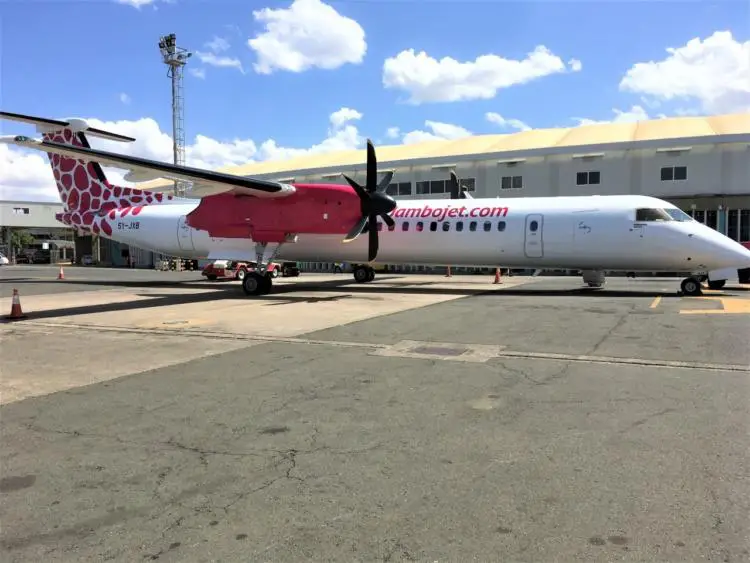Kenyan-based low-cost carrier Jambojet has announced plans to begin operations to North Kivu Capital, Goma in the Eastern Democratic Republic of the Congo, as well as to the Kenyan coastal island of Lamu.
In a statement, the carrier says the move is part of its expansion program, at a time when the coronavirus pandemic continues to have a devastating impact on the aviation sector in the region as well as across the world.
The company said its inaugural flight to Goma will be on 10th September 2021, starting with 2 frequencies weekly, with flights expected to grow to 4 frequencies weekly, flying on Monday, Wednesday, Friday, and Sunday.
The airline announced that it will be flying to Lamu 4 times weekly, starting 15th September 2021.
Commenting on the announcement, Jambojet Board of Directors Chairman Vincent Rague said the expansion plan has been in motion for 3 years.
“Three years ago, we embarked on an expansion plan that would see us expand our network across the region as well as grow our fleet. We had to put on hold some of the plans due to the COVID-19 pandemic. We are excited to launch these two new routes, and look forward to what is to come,” he said.
Rague noted that the airline is taking advantage of the huge opportunity that the African market has to offer, and the rising demand for air connectivity in the region.

“There is a growing demand for air transport across the continent, with the International Air Transport Association projecting that Africa will become one of the fastest-growing aviation regions within the next 20 years, with an average annual expansion rate of almost 5 percent. We, as Jambojet, are keen to be part of this growth,” he added.
Jambojet currently flies to 6 destinations including Mombasa, Diani, Eldoret, Kisumu, and Malindi from its primary hub in Nairobi. The airline also operates a direct flight from Mombasa to Kisumu and Eldoret.
Jambojet launches additional local flights, gears towards regional expansion
The offering comes months three months after Jambojet officially resumed operations to all its five local destinations, following the opening of the airspace after the Government of Kenya lifted the month-long partial lockdown affecting five counties including Nairobi.
The airline, like others around the world, has had a tough time operating due to the ongoing coronavirus pandemic.
Cessation of movement, lockdown, and restrictions of entering territories has been issued that heavily affected airlines, including Jambojet.
A report conducted by the African Airlines Association in June this year said that the Covid-19 pandemic continues its devastating effects on the aviation, travel, and tourism industry.
According to the report, traffic recovery between January and May was 37 percent of the 2019 level.
In May alone, traffic declined by 62.2 percent compared to the same month in 2019.
Similarly, capacity declined 53.1 percent compared to May 2021.
“Mauritius remains the most impacted hub, with a reduction of 98 percent of possible connections to/from African airports compared to March 2020,” the report noted.
Connectivity at Nairobi’s JKIA was reduced mainly due to schedule adjustments and frequency reduction of the national carrier, KQ.
Jambojet acquires new aircraft for regional expansion
Demand for domestic passenger travel continues to out-perform intra-Africa and intercontinental at 61.5 percent compared to 23.1 percent for intra-Africa and 15.1 percent for intercontinental.
In terms of capacity seats offered, domestic, intra-Africa, and intercontinental account for 47.7 percent, 27.2 percent, and 25.1 percent respectively.
After 3 consecutive months of increase in the number of international routes operated by African airlines (February-April), May saw a dip following border closure announcements by the governments of Algeria and Morocco resulting in airlines in the 2 countries suspending some routes.
Ethiopian, RwandAir, and SA Airlink however re-opened more routes in May.
“But the general constrained passenger demand is due to the continued increase in Covid-19 cases globally, constantly evolving travel health advisories as well as restrictive access to many tourist sites around the world,” the report said.
“With the low volume of traffic, airlines continue to suffer major losses month after month. In the first quarter of 2021 alone, airlines loss $2.6 billion, and the estimate for Q2 is $2.5b. In 2020, African airlines cumulatively lose $10.21 billion,” it added.











